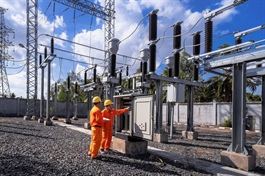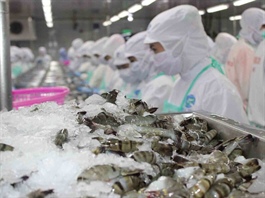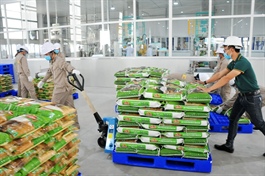Firms urged to restructure to cope with climate change
Firms urged to restructure to cope with climate change
Firms should pay attention to developing new business models, products and technologies to cope with climate change and turn its negative impact into impetus, a recent report of the Viet Nam Chamber of Commerce and Industry (VCCI) highlighted.

The report 'Adapting to succeed: Accessing the impact of climate change on Vietnamese businesses' was launched on Wednesday in Ha Noi and featured the voices of nearly 10,400 enterprises nationwide, including more than 8,700 domestic firms and nearly 1,600 foreign-invested.
This was considered the largest ever survey on the risks of natural disasters and climate change on manufacturing and production.
The report pointed out that climate change has left multi-faceted negative impacts on business performance, such as production interruption, reduction of labour capacity, revenue decreases, increasing in production expenditures, infrastructure damage and material input shortages.
The most vulnerable sectors were agriculture, forestry and fishery.
Enterprises in the central coastal and Mekong Delta regions were more affected by the risk of natural disasters and climate change than other regions.
The average loss caused by natural disasters and climate change was estimated at VND95.2 million (US$4,100) per business each, year while some suffered very huge losses.
The report found that many firms were aware of the need to respond to natural disasters and climate change risks through a variety of solutions from simple to complex. A considerable number of businesses adjusted their business models, upgraded their production technologies or purchased insurance against natural disaster risks.
According to the report, 44.5 per cent of surveyed businesses said they had some insurance against natural disaster and climate change risks and 86 per cent of those with insurance said that it was useful.
VCCI Chairman Vu Tien Loc told the event that Viet Nam was among the countries suffering the most from climate change, adding that the Government had improved the legal system on environmental production and gave priority to implementing programmes responding to natural disasters and climate change,
The report showed most surveyed firms said climate change and its challenges contributed to accelerating the process of restructuring, including the reorganisation of manufacturing and creating new products and technologies.
Businesses were also more willing to invest in improving compliance with environmental regulations. Some were willing to spend 7.32 per cent of their operating expenditures for environmentally-friendly targets.
Loc said that our behaviour with the environment will decide our future and the future of generations to come, urging actions to move towards a greener, cleaner and more sustainable Vietnamese and global economy.
Policies to encourage environmental protection and sustainable development needed to be improved, together with improving law enforcement, Loc said.
Loc also urged businesses to play their role in adapting to climate change and tackling environmental issues.
Viet Nam was ranked sixth among countries and territories hardest hit by extreme weather events between 1999 and 2018, according to the Global Climate Risk Index by the German environmental think tank Germanwatch.

























